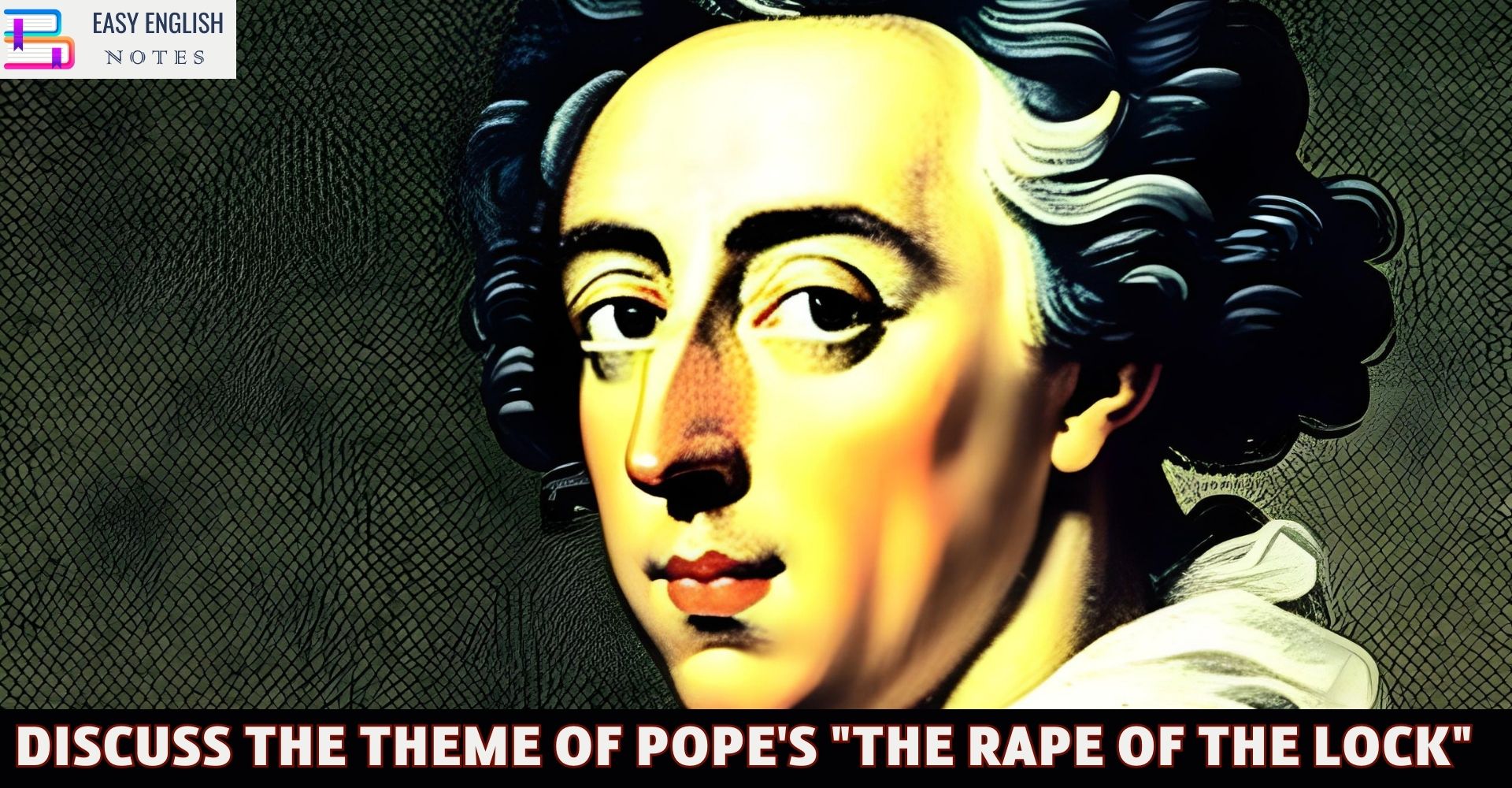In the realm of classic literature, few works are as intriguing and multi-layered as Alexander Pope’s “The Rape of the Lock.” This satirical masterpiece weaves together a rich tapestry of themes that transcend the boundaries of time and offer readers a captivating exploration of human nature, societal dynamics, vanity, and the ephemeral nature of beauty. Written in a mock-heroic style, the poem transforms a seemingly trivial incident into an epic narrative that unveils intricate layers of meaning and insight.
Introduction: Setting the Stage
Alexander Pope, a prominent 18th-century poet, was renowned for his wit, satire, and astute observations of human behavior. “The Rape of the Lock,” published in 1712, is a prime example of his skill in dissecting societal norms and human foibles while employing humor and irony. The poem revolves around a seemingly inconsequential event—a lock of hair being snipped—and transforms it into a thought-provoking exploration of human vanity, desire, and the complexities of social interactions.
The Trivial Incident: An Unveiling of Vanity and Desire
At the heart of “The Rape of the Lock” lies a seemingly trivial incident: Robert, the seventh Lord Petre, snips a lock of hair from Arabella Fermor. This act, driven by Lord Petre’s amorous nature, leads to unintended consequences that reverberate through societal circles. This incident serves as a metaphor for human vanity and the pursuit of fleeting desires, even at the cost of causing disruptions and conflicts within relationships.
Societal Dynamics and Social Critique
Pope ingeniously captures the intricate web of societal interactions and the dynamics that govern them. The incident of the stolen lock of hair becomes a catalyst for examining the interactions between families and their social circles. The quarrel between the Petre and Fermor families, prompted by this trivial act, underscores how societal norms and conventions can magnify minor incidents into significant disputes. The poem critiques the superficiality of social customs, highlighting how such conventions can be taken to excessive levels, resulting in unwarranted conflicts.
Also Read :
- Compare Hamlet with Macbeth, Othello and other Tragedies
- “The Pardoner’s Tale” is the finest tale of Chaucer
- Prologue to Canterbury Tales – (Short Ques & Ans)
- Confessional Poetry – Definition & meaning
- Line By Line Explanation Of The Poem The Eve of St. Agnes
The Mock-Heroic and the Mundane
Pope employs the mock-heroic style, typically used for grand epics, to elevate the mundane into the realm of epic proportions. By using epic conventions such as supernatural interventions and grand battles, Pope satirizes the triviality of human concerns. The theft of a lock of hair, in the hands of Pope, becomes a cosmic struggle of titanic proportions. This technique enables him to simultaneously ridicule and highlight the exaggerated importance people attach to trivial matters.
Beauty’s Allure and Ephemeral Nature
Belinda, the poem’s central character, embodies the allure of beauty and its transient nature. Her beauty captivates all who behold her, including herself. The dream sequence where Ariel warns her of impending danger serves as a cautionary tale against excessive pride and vanity. The theme of the ephemeral nature of beauty is further accentuated through Belinda’s journey in the poem. Her initial preoccupation with her appearance gives way to sorrow and introspection as she realizes the transitory nature of her charm.
Divine Intervention and the Ethereal Realm
The introduction of sylphs, ethereal beings assigned to protect Belinda’s beauty, introduces an otherworldly element into the narrative. These sylphs embody the theme of celestial intervention and serve as a reminder of the contrast between human desires and the overarching cosmic order. The sylphs’ attempts to safeguard Belinda’s lock highlight the interplay between fate, human agency, and the unseen forces that shape human destinies.
Umbriel and the Exploration of Darker Emotions
Umbriel, the melancholic gnome, plays a crucial role in the poem’s exploration of darker emotions. His journey to the cave of Spleen symbolizes the descent into the depths of human despair, ill-nature, and affectation. Through Umbriel’s interactions with Spleen, Pope delves into the intricacies of human emotions and the potential for negative emotions to amplify conflicts. This theme emphasizes the volatility of human feelings and the potential for small incidents to trigger profound emotional reactions.
Conflict and Resolution: Satirical Observations
The poem’s climax revolves around the confrontation between Belinda and Lord Petre over the stolen lock of hair. This moment encapsulates the culmination of various themes—vanity, desire, societal norms, and cosmic intervention. The satirical portrayal of this confrontation reveals the absurdity of human conflicts driven by vanity and trivial pursuits. The pinch of snuff that subdues Lord Petre, resulting in his sneezing, adds a touch of comedy while offering a resolution to the dispute.
Transformation and Reflection: The Lock as a Star
In the poem’s denouement, Pope elevates the lock of hair to the status of a star in the heavens. This transformation symbolizes the transcendent nature of beauty and the permanence it achieves through poetic transformation. This ending reinforces the poem’s exploration of the ephemeral and the enduring, bridging the gap between the earthly and the celestial.
Conclusion: A Masterpiece of Insight and Satire
“The Rape of the Lock” emerges as a literary masterpiece that defies categorization. Its intricate exploration of themes such as vanity, societal dynamics, the allure of beauty, and the role of supernatural forces demonstrates Pope’s profound understanding of human nature. Through the lens of satire, he offers a mirror to society, exposing its follies and exaggerated concerns. While rooted in a seemingly insignificant incident, the poem’s universal themes resonate across centuries, inviting readers to reflect on the nature of human desires, the fragility of beauty, and the interplay between the mundane and the celestial. As a result, “The Rape of the Lock” stands as a timeless work that continues to captivate and provoke thought, offering an enduring testament to Pope’s literary genius.
PLEASE HELP ME TO REACH 1000 SUBSCRIBER ON MY COOKING YT CHANNEL (CLICK HERE)











